人教版 初二升初三英语资料
人教版英语 初二升初三培优资料(8)
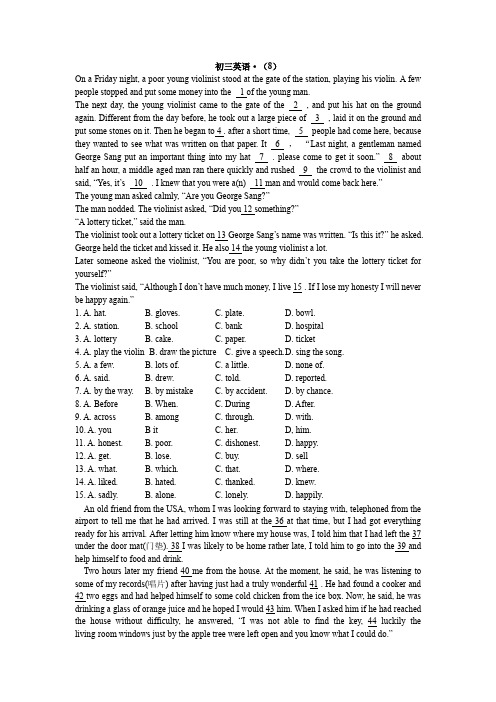
初三英语·(8)On a Friday night, a poor young violinist stood at the gate of the station, playing his violin. A few people stopped and put some money into the 1 of the young man.The next day, the young violinist came to the gate of the 2 , and put his hat on the ground again. Different from the day before, he took out a large piece of 3 , laid it on the ground and put some stones on it. Then he began to 4 . after a short time, 5 people had come here, because they wanted to see what was written on that paper. It 6 ,“Last night, a gentleman named George Sang put an important thing into my hat 7 . please come to get it soon.”8 about half an hour, a middle-aged man ran there quickly and rushed 9 the crowd to the violinist and said, “Yes, it’s 10 . I knew that you were a(n) 11 man and would come back here.”The young man asked calmly, “Are you George Sang?”The man nodded. The violinist asked, “Did you 12 something?”“A lottery ticket,” said the man.The violinist took out a lottery ticket on 13 George Sang’s name was written. “Is this it?” he asked. George held the ticket and kissed it. He also 14 the young violinist a lot.Later someone asked the violinist, “You are poor, so why didn’t you take the lottery ticket for yourself?”The violinist said, “Although I don’t have much money, I live 15 . If I lose my honesty I will never be happy again.”1. A. hat. B. gloves. C. plate. D. bowl.2. A. station. B. school C. bank D. hospital3. A. lottery B. cake. C. paper. D. ticket4. A. play the violin B. draw the picture C. give a speech. D. sing the song.5. A. a few. B. lots of. C. a little. D. none of.6. A. said. B. drew. C. told. D. reported.7. A. by the way. B. by mistake C. by accident. D. by chance.8. A. Before B. When. C. During D. After.9. A. across B. among C. through. D. with.10. A. you B it C. her. D, him.11. A. honest. B. poor. C. dishonest. D. happy.12. A. get. B. lose. C. buy. D. sell13. A. what. B. which. C. that. D. where.14. A. liked. B. hated. C. thanked. D. knew.15. A. sadly. B. alone. C. lonely. D. happily.An old friend from the USA, whom I was looking forward to staying with, telephoned from the airport to tell me that he had arrived. I was still at the 36 at that time, but I had got everything ready for his arrival. After letting him know where my house was, I told him that I had left the 37 under the door-mat(门垫). 38 I was likely to be home rather late, I told him to go into the 39 and help himself to food and drink.Two hours later my friend 40 me from the house. At the moment, he said, he was listening to some of my records(唱片) after having just had a truly wonderful 41 . He had found a cooker and 42 two eggs and had helped himself to some cold chicken from the ice box. Now, he said, he was drinking a glass of orange juice and he hoped I would 43 him. When I asked him if he had reached the house without difficulty, he answered, “I was not able to find the key, 44 luckily the living-room windows just by the apple tree were left open and you know what I could do.”I listened to all this in 45 . In front of my living-room there was no apple tree at all.36. A. living-room. B. office. C. airport. D. house.37. A. address. B. telephone number C. key. D. traveling plan.38. A. As. B. When. C. If. D. Though.39. A. store. B. restaurant. C. fridge. D. kitchen.40. A. invited. B. asked. C. answered. D. telephoned.41. A. meal. B. rest. C. time. D. picnic.42. A. got. B. broke. C. fried. D. bought.43. A. visit. B. join. C. thank. D. remember.44. A. but. B. so. C. or. D. and.45. A. interest. B. anger. C. surprise. D. excitement.The other day I was talking to a stranger on the bus; he told me that he had a good _36___ in Chicago and he wondered if, by any chance, I 37 to know him. For a moment, I thought he might be 38 , but I could tell from the expression on his face that he was not. He was 39 .I felt like saying that it was ridiculous to 40 that out of all the millions of people in Chicago I could possibly have ever bumped into his friend. But, 41 , I just smiled and reminded him that Chicago was a very 42 city. He nodded, and I thought he was going to be content to drop the subject and talk about something else. But I was wrong. He was silent for a few minutes, and then he 43 to tell me all about his friend.His friend’s main 44 in life seemed to be tennis. He was an excellent tennis player, and he 45 had his own tennis court. There were a lot of people with swimming 46 , yet there were only two people with private tennis courts; his friend in Chicago was one of them. I told him that I knew several 47 like that, including my brother, who was a doctor in California. He 48 that maybe there were more private courts in the country than he 49 , but he did not know of any others. Then he asked me 50 my brothers lived in California. When I said Sacramento, he said that was a coincidence 51 his Chicago friend spent the summer in Sacramento last year and he lived next door to a 52 who had a tennis court in his backyard. I said I felt that really was a coincidence because my next-door neighbor had gone to Sacramento last summer and had 53 the house next to my brother’s house. For a moment, we stared at each other, but we did not say anything.“Would your friend’s name happen to be Roland Kirkwood?”I asked finally. He __54__and said, “Yes. Would your brother’s name happen to be Rey Hunter?”It was my 55 to laugh. “Yes.”I replied.36 A.brother B.teacher C.neighbour D.friend37 A.managed B.happened C.tried D.wanted38 A.expecting B.1ying C.joking D.talking39 A.funny B.serious C.careful D.disappointed40 A. think B.find C.realize D.see41 A.indeed B.actually C.instead D.exactly42 A.famous B.interesting C.noisy D.big43 A.began B.stopped C.refused D.failed44 A.problem B.interest C.choice D.work45 A.just B.ever C.even D.surely46 A.suit B.habit C.pools D.river47 A.people B.players C.strangers D.friends48 A.advised B.argued C.admitted D.announced49 A.recognized B.realized C.visited D.found50 A.how B.whether C.when D.where51 A.because B.if C.then D.though52 A.doctor B.friend C.neighbour D.player53 A.rented B.visited C.designed D.sold54 A.smiled B.1aughed C.cried D.nodded55 A.chance B.pleasure C.time D.Turn根据短文内容及所给首字母填出所缺单词Martin Murray is now a t_____ student. But before people thought he was a problem guy. What did he u____ to do?After his father’s d______, things got w______. His mother couldn’t a____ his education. He was not i_____ in studying at all, and he often made trouble. His mother made a final d_____:to send him to a boys’boarding school. But Martin hated it. However, a recent talk with his mother c_____ his life. Exactly he did so. Now his mother really takes p____ in him. Martin thanked his mother because it’s her love that has helped him to feel good about himself. As he says, “It’s i_____ for parents to be there for their children.”根据汉语提示和要求写一篇80词左右的短文。
八升九语法过关复习学案3-人教版英语(新九年级)暑假衔接
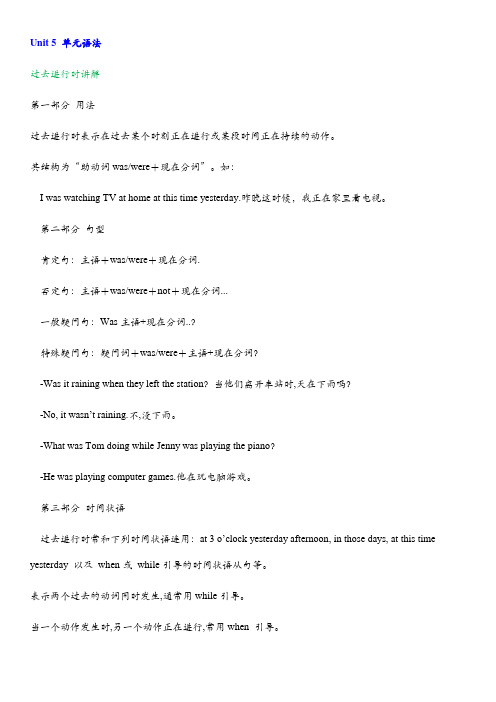
Unit 5 单元语法过去进行时讲解第一部分用法过去进行时表示在过去某个时刻正在进行或某段时间正在持续的动作。
其结构为“助动词was/were+现在分词”。
如:I was watching TV at home at this time yesterday.昨晚这时候,我正在家里看电视。
第二部分句型肯定句:主语+was/were+现在分词.否定句:主语+was/were+not+现在分词...一般疑问句:Was主语+现在分词..?特殊疑问句:疑问词+was/were+主语+现在分词?-Was it raining when they left the station?当他们离开车站时,天在下雨吗?-No, it wasn’t raining.不,没下雨。
-What was Tom doing while Jenny was playing the piano?-He was playing computer games.他在玩电脑游戏。
第三部分时间状语过去进行时常和下列时间状语连用:at 3 o’clock yesterday afternoon, in those days, at this time yesterday 以及when或while引导的时间状语从句等。
表示两个过去的动词同时发生,通常用while引导。
当一个动作发生时,另一个动作正在进行,常用when 引导。
巩固练习一、用所给动词的适当形式填空。
1. -How did you fall in love with my dad, Mum?-He ___________ (make) a speech when I first saw him. He was so handsome and got a very attractive voice, you know, back then.2.He___________ (draw) on the beach from 7 to 9 o'clock yesterday morning.3.My mother ___________ (not walk) with me at this time yesterday.4.Lucy ___________ (dance) while her sister(sing) at 6:00 p.m. yesterday.二、单项选择。
人教版英语 初二升初三培优资料(2)
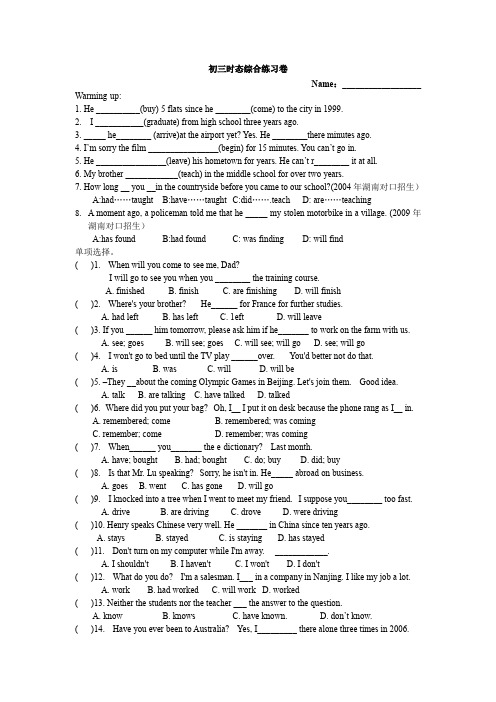
初三时态综合练习卷Name:__________________ Warming-up:1. He __________(buy) 5 flats since he ________(come) to the city in 1999.2. I ___________(graduate) from high school three years ago.3. _____ he________ (arrive)at the airport yet? Yes. He ________there minutes ago.4. I’m sorry the film ________________(begin) for 15 minutes. You can’t go in.5. He ________________(leave) his hometown for years. He can’t r________ it at all.6. My brother ____________(teach) in the middle school for over two years.7. How long __ you __in the countryside before you came to our school?(2004年湖南对口招生)A:had……taught B:have……taught C:did…….teach D: are……teaching8. A moment ago, a policeman told me that he _____ my stolen motorbike in a village. (2009年湖南对口招生)A:has found B:had found C: was finding D: will find单项选择。
()1. --When will you come to see me, Dad?--I will go to see you when you ________ the training course.A. finishedB. finishC. are finishingD. will finish()2. --Where's your brother? --He______ for France for further studies.A. had leftB. has leftC. 1eftD. will leave()3. If you ______ him tomorrow, please ask him if he_______ to work on the farm with us.A. see; goesB. will see; goesC. will see; will goD. see; will go()4. --I won't go to bed until the TV play ______over. --You'd better not do that.A. isB. wasC. willD. will be()5. –They __about the coming Olympic Games in Beijing. Let's join them. --Good idea.A. talkB. are talkingC. have talkedD. talked()6. -Where did you put your bag?--Oh, I__ I put it on desk because the phone rang as I__ in.A. remembered; comeB. remembered; was comingC. remember; comeD. remember; was coming()7. --When______ you_______ the e-dictionary? --Last month.A. have; boughtB. had; boughtC. do; buyD. did; buy()8. --Is that Mr. Lu speaking?--Sorry, he isn't in. He_____ abroad on business.A. goesB. wentC. has goneD. will go()9. --I knocked into a tree when I went to meet my friend.--I suppose you________ too fast.A. driveB. are drivingC. droveD. were driving()10. Henry speaks Chinese very well. He _______ in China since ten years ago.A. staysB. stayedC. is stayingD. has stayed()11. --Don't turn on my computer while I'm away. -- ____________.A. I shouldn'tB. I haven'tC. I won'tD. I don't()12. --What do you do? --I'm a salesman. I___ in a company in Nanjing. I like my job a lot.A. workB. had workedC. will workD. worked()13. Neither the students nor the teacher ___ the answer to the question.A. knowB. knowsC. have known.D. don’t know.()14. --Have you ever been to Australia? --Yes, I_________ there alone three times in 2006.A. have beenB. have goneC. wentD. had gone()15. He works as a teacher now, but he________ on a farm for three years.A. workedB. has workedC. had workedD. works()16--Mum, _______ shall we have lunch? --We will have it when your dad_________.A. when; returnsB. where; returnsC. where; will returnD. when; will return()17. --Tomorrow will be Father's Day. What will you do for your father?-- I will say "I love you, Daddy" as soon as he _______ up.A. will wakeB. is wakingC. wakesD. woke()18. Our teacher said light________ faster than sound.A. travelledB. has travelledC. is travellingD. travels()19 --Let's go fishing if it ___ this weekend.--But nobody knows if it_____.A. is fine, will rainB. will be fine, rainsC. is fine, rainsD. will be fine, will rain() 20. --Is your father a doctor? --Yes, he is. He______ in Town Hospital.A. has workedB. had workedC. worksD. worked() 21. --Where's your mother, Helen? --She_____ the flowers in the garden.A. watersB. wateredC. is wateringD. has watered()22. It ____ ten years since we last ____ in Beijing.A. was, met.B. has been, met.C. was, meet.D. is, meet.()23. --Shall we invite Tom to play football now? --Oh, no. He___ his clothes.A. is washingB. washesC. has washedD. washed()24. Simon______ his fingers when he was cooking the dinner.A. burntB. was burningC. has burntD. had burnt()25. -- I'm sorry you have missed the bus. It____five minutes ago. -- What a pity!A. was leavingB. has leftC. leftD. leaves()26. --Mr. Johnson, we have found your watch. --My watch!Thank you. Where____ it?A. do you findB. have you foundC. did you findD. were you finding()27. -- I came to your home yesterday afternoon, but nobody was in.-- Oh, we_______ some shopping in the supermarket.A. have doneB. didC. were doingD. are doing()28. --What do you think of the color of my new dress?--Sorry, but what did you say? I______ about something else.A. thinkB. thoughtC. am thinkingD. was thinking()29. I ____ my homework while my parents ____ TV last night.A. did; have watchedB. was doing; were watchingC. had done; were watchingD. would do; were watching()30.--Hello,this is Lily speaking.Could I speak to Mr. Black?--Sorry.He______ the Xuanwu Lake Park.A. has been to;B. went toC. has gone toD. will go to()31. --Would you like to see the film with me? --I'm sorry I_____it twice.A. seeB. will seeC. have seenD. am seeing()32. --Did you see Mr. Chen yesterday afternoon?--No. When I got to school, he__ already.A. leftB. has leftC. was leavingD. had left()33. ---You've left the light on.---Oh, sorry._______and turn it off.A. I've goneB. I'11 goC. I wentD. I'm going()34. When I saw his smiling face, I knew he_______ good news of his parents.A. has hadB. had hadC. was havingD. has()35. You won’t know if it fits until you______ it on.A. had triedB. are tryingC. have triedD. will try()36. By the time he was twelve, Edison__________ to make a living by himself.A. would beginB. has begunC. had begunD. was begun()37. Mei Lin has been a teacher ____.A. for two years ago.B. since two years.C. since she comes here.D. since two years ago. ()38. I _________ ten minutes to decide whether I should refuse the offer.A. gaveB. was givenC. was givingD. had given()39. When Jack arrived,he learned Mary______ for almost an hour.A. had goneB. had set offC. had leftD. had been away()40. --Is Feiyun Bridge open to the public yet? --Yes. It _ for about one and a half months.A. has opened.B. has being opened.C. has been open.D. was open.()41. Since 2000, Nanchang has become a new city. Everything ____.A. is changed.B. was changed.C. has changed.D. had changed.()42.--- ___ the sports meet might be put off. --- Yes, it all depends on the weather.A. I’ve been told B I’ve told C. I’m telling D. I told()43. I first met Lisa three years ago. She_________ at a radio shop at the time.A. has workedB. was workingC. had been workingD. had worked ()44. --Joan, you are late! --Sorry, I ______ next time. (2006年浙江)A. don'tB. won'tC. am notD. haven't()45.“Could I use your motorcycle?” Jim asked me.Jim asked_____.A. he could use my motorcycleB. if he were able to use my motorcycle.C. me whether he could use my motorcycle.D. my whether he was able to use my motorcycle.()46She ____ at the stop when somebody ____ her from behind.A. was waiting, called.B. was waiting, was calling.C. waited, called.D.waited,was calling. ()47.--- Has he seen this film ?---Yes. He _______ it several days ago.A. sawB. has seenC. had seenD. was seeing()48.While you _______ I will read you today’s newspaper.A. were restingB. will restC. have restedD. are resting()49.It was said that his mother _________.A. was dyingB. has diedC. has been deadD. died()50.We won’t go unless you _________ soon.A. cameB. comeC. will comeD. had come()51.Do you know when he _____?A. arriveB. arrivesC. has arrivedD. will arrive()52.---When _________ the training course begin?---Next Monday.A. hasB. is going toC. doesD. did()53.Up to now, everything _______ well. A. is gone B. has gone C. go D. will go ()54.Our teacher told us that the earth _______ from west to east.A. turnsB. turnC. has turnedD. had turned()55.I ________ to see you, but I didn’t, for I ________ no time.A. wanted; haveB. wanted; hadC. had wanted; hadD. had wanted; would have()56.You had a shock when you heard the news, ________ you?A. hadn’tB. didn’tC. wouldn’tD. won’t()57.----When ________ you buy the car?---- I ___________.A. did; have bought it for a monthB. did; bought it a month agoC. will; bought it for a monthD. will; would buy it in a week()58.We were all surprised when he made it clear that he _________ office soon.A. leavesB. would leaveC. leftD. had left()59.You don’t need to describe her, I _______ her several times.A. had metB. have metC. metD. meet()60.---You haven’t been to Beijing, have you?---_____. How I wish to go there!A. Yes, I haveB. Yes, I haven’tC. No, I haveD. No, I haven’t()61.---- You have left the light on.----Oh, so I have. _______ and turn it off.A. I’ll goB. I’ve goneC. I goD. I’m going()62.I ___ ping-pong quite well, but I haven’t had time to play since the new year.A. will playB. have playedC. playedD. play()63.----Is this raincoat yours?----No, mine ________ there behind the door.A. hangsB. has hungC. is hangingD. hung()64.I ________ here until you give me some money.A. leaveB. will leaveC. shall leaveD. won’t leave()65.----Did Mr. Baker go to Japan last year?--- No, ____________.A. he did never go thereB. he has never go thereC. he never was thereD. he’s never been there()66.It ________ be long before such a thing _________ again.A. won’t ; happensB. doesn’t ; is happeningC. won’t ; will happenD. doesn’t ; happens ()67.The scientist____ Antarctica and he will give us a talk when he _____ back.A. has gone to; will comeB. has been to; comesC. has gone to; comesD. has been to; will come()68.It _______ five years since he _____ to the earth.A. is; has returnedB. has been; returnedC. has been; has returnedD. is ; was returning ()69. Lucy and Lily can speak good Chinese, because they___ China for six years.A.have been in B.have been to C.has been in D.have gone to()70.I’m sorry, I ________ notice you. When _________ you come?A. don’t ; willB. don’t ; didC. didn’t ; didD. don’t ; do()71.The sky is very dark now. I’m afraid it _________.A. will rainB. is going to rainC. is about rainingD. it would rain()72._________ you ever _________ to the West Hills?A. Will; goB. Had; beenC. Have; goneD. Have; been()73.They ___________ friends since they met in Shanghai.A. have madeB. have becomeC. have beenD. have returned()74. This English song _____ often _____ by the children.A. is,singingB. is,sungC. will,singD. was,sung()75. The windows of our house _____ once a week.A. must cleanB. have cleanedC. is cleanedD. are cleaned()76. When ______ the People's Republic of China _____?A. was,foundB. was,foundedC. did,foundD. does,found()77. Mary's radio ______ by my brother just now.A. will be mendedB. has mendedC. was mendedD. mended()78.–Could you tell me what time the train leaves for Beijing?--I’m afraid you need to ____ on the Internet.A. look it over.B. look for itC. look at it.D. look it up()79. After reading the story of Tom, I was very _____. --_____. She is really brave.A.relaxed. So was I.B. impressing. So did IC. impressed. So was ID. relaxing. So did I()80. . As your spoken English gets better, _____ your written English.A. such will.B. neither willC. so willD. nor will.II. 用括号中单词的适当形式填空。
2023年八年级升九年级人教版英语暑假衔接第五讲use的用法及八年级回顾及九年级预习
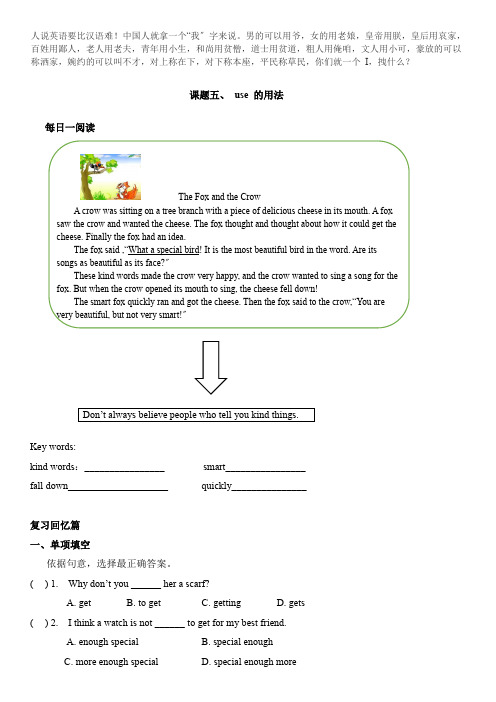
人说英语要比汉语难!中国人就拿一个“我〞字来说。
男的可以用爷,女的用老娘,皇帝用朕,皇后用哀家,百姓用鄙人,老人用老夫,青年用小生,和尚用贫僧,道士用贫道,粗人用俺咱,文人用小可,豪放的可以称洒家,婉约的可以叫不才,对上称在下,对下称本座,平民称草民,你们就一个I,拽什么?课题五、use 的用法每日一阅读The Fox and the CrowA crow was sitting on a tree branch with a piece of delicious cheese in its mouth. A foxsaw the crow and wanted the cheese. The fox thought and thought about how it could get thecheese. Finally the fox had an idea.The fox said ,“What a special bird! It is the most beautiful bird in the word. Are itssongs as beautiful as its face?〞These kind words made the crow very happy, and the crow wanted to sing a song for the fox. But when the crow opened its mouth to sing, the cheese fell down!The smart fox quickly ran and got the cheese. Then the fox said to the crow,“You are very beautiful, but not very smart!〞Key words:kind words:________________smart________________fall down____________________quickly_______________复习回忆篇一、单项填空依据句意,选择最正确答案。
人教版英语 初二升初三培优资料(6)
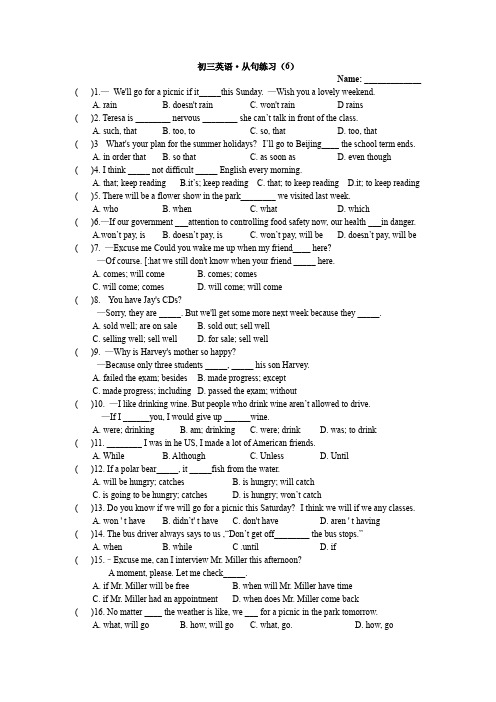
初三英语·从句练习(6)Name: _____________ ( )1.—We'll go for a picnic if it_____this Sunday. —Wish you a lovely weekend.A. rainB. doesn't rainC. won't rain D rains( )2. Teresa is ________ nervous ________ she can’t talk in front of the class.A. such, thatB. too, toC. so, thatD. too, that( )3-- What's your plan for the summer holidays?--I’ll go to Beijing____ the school term ends.A. in order thatB. so thatC. as soon asD. even though( )4. I think _____ not difficult _____ English every morning.A. that; keep readingB.it’s; keep readingC. that; to keep readingD.it; to keep reading ( )5. There will be a flower show in the park________ we visited last week.A. whoB. whenC. whatD. which( )6.—If our government ___attention to controlling food safety now, our health ___in danger.A.won’t pay, isB. doesn’t pay, isC. won’t pay, will beD. doesn’t pay, will be ( )7. —Excuse me Could you wake me up when my friend____ here?—Of course. [:hat we still don't know when your friend _____ here.A. comes; will comeB. comes; comesC. will come; comesD. will come; will come( )8. --You have Jay's CDs?—Sorry, they are _____. But we'll get some more next week because they _____.A. sold well; are on saleB. sold out; sell wellC. selling well; sell wellD. for sale; sell well( )9. —Why is Harvey's mother so happy?—Because only three students _____, _____ his son Harvey.A. failed the exam; besidesB. made progress; exceptC. made progress; includingD. passed the exam; without( )10. —I like drinking wine. But people who drink wine aren’t allowed to drive.—If I ______you, I would give up ______wine.A. were; drinkingB. am; drinkingC. were; drinkD. was; to drink( )11. ________ I was in he US, I made a lot of American friends.A. WhileB. AlthoughC. UnlessD. Until( )12. If a polar bear_____, it _____fish from the water.A. will be hungry; catchesB. is hungry; will catchC. is going to be hungry; catchesD. is hungry; won’t catch( )13. Do you know if we will go for a picnic this Saturday? -I think we will if we any classes.A. won ' t haveB. didn’t' t haveC. don't haveD. aren ' t having( )14. The bus driver always says to us ,“Don’t get off________ the bus stops.”A. whenB. while C .until D. if( )15.–Excuse me, can I interview Mr. Miller this afternoon?-- A moment, please. Let me check_____.A. if Mr. Miller will be freeB. when will Mr. Miller have timeC. if Mr. Miller had an appointmentD. when does Mr. Miller come back( )16. No matter ____ the weather is like, we ___ for a picnic in the park tomorrow.A. what, will goB. how, will goC. what, go.D. how, go( )17. --Excuse me, can you tell me which road I should take to the post office?--_____ of the four roads will do.A. Any.B. Neither.C. Both.D. Every.( )18. His hobby is ____ swimming _____ skating. It’s playing baseball.A. either, or.B. both, and.C. not only, but also.D. neither, nor.( )19. Did you see the hit New Year’s movie—If You Are The One(非诚勿扰) last night?--Yes. But when I got to the movie theater, the film _____ for ten minutes.A. had begunB. had been onC. had startedD. began.( )20. Many people ask Mr. Wen Jiabao, our Premier, ______.A.how will the Central Government take measures(措施) to stop the increase of the housingprices.B.what the Central Government will do to cut the housing prices.C.that if the Central Government will take measures to stop the increase of the housingprices.D.when will the Central Government take measures to stop the increase of the housingprices.阅读下列短文,从每小题所给的A、B、C、D四个选项中选出最佳选项。
2021-2022学年八年级升九年级英语人教版暑假专题讲义:宾语从句(无答案)

八升九暑假专题训练Day2-3 宾语从句一.从句的分类:主语从句宾语从句表语从句同位语从句定语从句状语从句英语从句特点:①复合句句中不能独立成句,但有主语和谓语部分①(必须)由一个关联词引导二.宾语从句定义:在复合句子中作宾语的从句He likes seeing films.He said that he would go to see a film tomorrow.三.宾语从句的基本结构Linda thinks that he is a good student.主语+谓语+关联词+宾语从句剩余部分四.宾语从句的连接词从属连词:that,whether,if疑问代词:who,what,which,whom,whose,whatever,whoever,whichever疑问副词:when,where,how,why1.that的用法that引导宾语从句时,that只起了解作用,其本身在从句中不充当任何成分,在口语或者非正式文体中常被忽略主语+谓语+宾语从句((that)+陈述句)例:I think (that) you should be more careful.注意:下列情况中that不可省略①有多个宾语从句并列时,只能省略第一个that,其他的不能省略例:She said (that) the story was true and that she wouldn’t tell others about it.①当it作形式宾语代替that引导的宾语从句时,that不能省略。
例:They want to make it clear to the public that they do an important job.①在that引导的宾语从句中又含有从句时,that一般不省略例:I think that if you study hard you will pass the test.2.whether/if的用法在对宾语从句所表达的内容不确定时,要用whether或if引导,意为“是否”,但不充当成分。
2021-2022学年八年级升九年级英语人教版暑假专题讲义:时态(无答案)
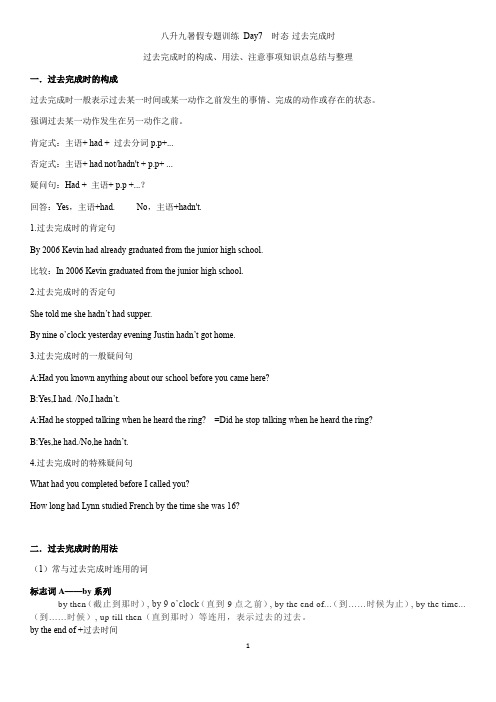
八升九暑假专题训练Day7 时态-过去完成时过去完成时的构成、用法、注意事项知识点总结与整理一.过去完成时的构成过去完成时一般表示过去某一时间或某一动作之前发生的事情、完成的动作或存在的状态。
强调过去某一动作发生在另一动作之前。
肯定式:主语+ had + 过去分词p.p+...否定式:主语+ had not/hadn't + p.p+ ...疑问句:Had + 主语+ p.p +...?回答:Yes,主语+had. No,主语+hadn't.1.过去完成时的肯定句By 2006 Kevin had already graduated from the junior high school.比较:In 2006 Kevin graduated from the junior high school.2.过去完成时的否定句She told me she hadn’t had supper.By nine o’clock yesterday evening Justin hadn’t got home.3.过去完成时的一般疑问句A:Had you known anything about our school before you came here?B:Yes,I had. /No,I hadn’t.A:Had he stopped talking when he heard the ring? =Did he stop talking when he heard the ring?B:Yes,he had./No,he hadn’t.4.过去完成时的特殊疑问句What had you completed before I called you?How long had Lynn studied French by the time she was 16?二.过去完成时的用法(1)常与过去完成时连用的词标志词A——by系列by then(截止到那时), by 9 o’clock(直到9点之前), by the end of...(到……时候为止), by the time...(到……时候), up till then(直到那时)等连用,表示过去的过去。
2023年八年级升九年级人教版暑假衔接第二讲英语语法思维导图

别懊丧,生活就像心电图,一帆风顺就证明你挂了。
课题二、英语语法思维导图第一局部中考语法思维导图词:__________________________________________________________________________ ____________________________________________句:__________________________________________________________________________ ____________________________________________其次局部词类与句子专题一词类词类英语名称例词做题考虑名词Noun (n. )pen (钢笔)English (英语)life (生活)people(人们)1.可数名词和不行数名词2.单复数3.全部格冠词Article (art. ) a / an (一、一个)the (这,那)1.the 表示特指;2.a / an 表示泛指,3.a 用在辅音音素开头的单词前,an 用在元音音素开头的单词前。
代词Pronoun(pron.)we (我们), his (他的),,this (这个)1.人称代词,物主代词,反身代词表及用法2.指示代词:this, that, these, those3.复合不定代词4.不定代词形容词Adjective(adj.)free (空闲的),happy (欢乐的),interesting (好玩的)1.用来修饰名词,表示人或事物的特征, 放名词前面2.放系动词之后3.级专题二、动词分类1.实义动词2.系动词3.助动词4.情态动词专题三、句子成分1.句子是由词依据肯定的语法结构组成的,组成句子的各个局部叫做句子成分。
2.常见的句子成分包括主语、谓语、宾语、表语、定语、补语、状语、同位语。
3.英语句子的主体成分为主语和谓语,其他为次要成分。
人教版英语 初二升初三培优资料(9)
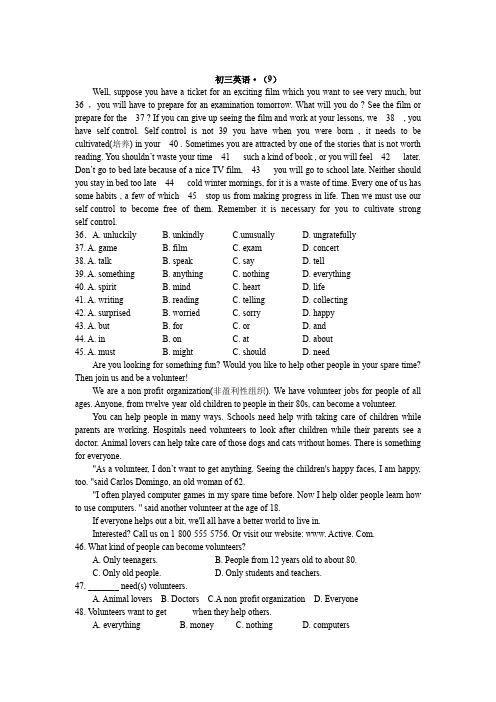
初三英语·(9)Well, suppose you have a ticket for an exciting film which you want to see very much, but 36 ,you will have to prepare for an examination tomorrow. What will you do ? See the film or prepare for the 37 ? If you can give up seeing the film and work at your lessons, we 38 , you have self-control. Self-control is not 39 you have when you were born , it needs to be cultivated(培养) in your 40 . Sometimes you are attracted by one of the stories that is not worth reading. You shouldn’t waste your ti me 41 such a kind of book , or you will feel 42 later. Don’t go to bed late because of a nice TV film, 43 you will go to school late. Neither should you stay in bed too late 44 cold winter mornings, for it is a waste of time. Every one of us has some habits , a few of which 45 stop us from making progress in life. Then we must use our self-control to become free of them. Remember it is necessary for you to cultivate strong self-control.36.A. unluckily B. unkindly C.unusually D. ungratefully37. A. game B. film C. exam D. concert38. A. talk B. speak C. say D. tell39. A. something B. anything C. nothing D. everything40. A. spirit B. mind C. heart D. life41. A. writing B. reading C. telling D. collecting42. A. surprised B. worried C. sorry D. happy43. A. but B. for C. or D. and44. A. in B. on C. at D. about45. A. must B. might C. should D. needAre you looking for something fun? Would you like to help other people in your spare time? Then join us and be a volunteer!We are a non-profit organization(非盈利性组织). We have volunteer jobs for people of all ages. Anyone, from twelve-year-old children to people in their 80s, can become a volunteer.You can help people in many ways. Schools need help with taking care of children while parents are working. Hospitals need volunteers to look after children while their parentssee a doctor. Animal lovers can help take care of those dogs and cats without homes. There is something for everyone."As a volunteer, I don’t want to get an ything. Seeing the children's happy faces, I am happy, too. "said Carlos Domingo, an old woman of 62."I often played computer games in my spare time before. Now I help older people learn how to use computers. " said another volunteer at the age of 18.If everyone helps out a bit, we'll all have a better world to live in.Interested? Call us on 1-800-555-5756. Or visit our website: www. Active. Com.46. What kind of people can become volunteers?A. Only teenagers.B. People from 12 years old to about 80.C. Only old people.D. Only students and teachers.47. _______ need(s) volunteers.A. Animal loversB. DoctorsC.A non-profit organizationD. Everyone48. V olunteers want to get when they help others.A. everythingB. moneyC. nothingD. computers49. Carlos Domingo does volunteer work withA. dogsB. catsC. old peopleD. children50.This passage might be .A. a story on a newspaperB. a play in a magazineC. a posterD. a TV playThe Winter Olympics are also called the White Olympics. At this time, many colorful stamps are published (发行) to mark (标志) the great Games. The first stamps marking the opening came out on January 25, 1932 in the United States for the 3rd White Olympics. From then on, publishing stamps during the White Olympics became a rule.During the 4th White Olympics, a set of stamps were published in Germany in November 1936. The five Olympics rings were drawn on the front of the sportswear. It was the first time that the rings appeared(出现) on stamps celebrating the White Olympics.In the 1950's, the stamps became more colorful. When the White Olympics arrived, the host countries (东道国) as well as the non-host countries published stamps to mark the Games. China also published four stamps in February 1980, when Chinese sportsmen began to take part in the White Olympics.Japan is the only Asian country that has ever held the White Olympics. Altogether 14,500 million stamps were sold to raise (筹集) money for this sports meet.Different kinds of sports were drawn on these small stamps. People can enjoy the beauty of the wonderful movements of some sportsmen.51. The White Olympics and the Winter Olympics________.A. are the same thingB. are different gamesC. are not held in winterD. are held in summer52. It was established(确定) as a rule that stamps be printed to mark the Winter Olympics _____.A. after the year 1936B. after the 3rd White OlympicsC. before the 3rd White OlympicsD. before the year 193253. The Winter Olympics are held ________.A. every two yearsB. every three yearsC. every four yearsD. every five years54. Which of the following is true?A. Only the host countries can publish stamps to mark the Games.B. Only the non-host countries can publish stamps to mark the Games.C. All countries can publish stamps to mark the Games.D. Japan can't publish stamps to mark the Games.55. What is more likely(很可能) to appear on the stamps of the White Olympics?A. Basketball.B. Table tennis.C. Football.D. Skating.How do you feel when you have to make a speech in front of class? What about when you go to a birthday party? Do you get really shy? Shyness means feeling nervous or frightened when you’re around other peo ple. Experts(专家)have found that more than 80 percent of middle school students feel afraid to be the center of attention. Some kids are born shy. Some become shy later because of their life experience.It’s OK if it takes you a while to feel yourself aga in when you go to a new place or meet new people. In fact, everybody gets a little shy sometimes. It’s just a case of how much. Most people have red faces and talk in broken sentences when they get shy. But some become so shy that theywon’t go to a restau rant because they are too nervous to order and pay for their food. Some are afraid of meeting new people, so they seldom go outside. This kind of shyness can be bad for a person. If shyness doesn’t stop you from doing something you want to do, being shy isn’t a very big problem. Some experts say shy people are cleverer because they think more and talk less. Shy people are also good at working with others because they think more for other people. Some great people in history were shy, too.You see, being shy isn’t all bad. But remember not to let good opportunities pass by just because of it! If you have to sing a song at a birthday party or practice your spoken English in front of others, just do it! There’s nothing to be afraid of .56. The underl ined phrase “to feel yourself again” in the second paragraph means _______A. to find oneselfB. to be oneselfC. to enjoy oneselfD. to help oneself57. What kind of shyness can be bad according to the passage?A. You find it hard to enjoy yourself at a party.B. You feel a little nervous when you go to a new place.C. You seldom go outside, afraid of meeting new people.D. You have a red face when you’re asked to answer a question in class.58. If you have to practice your spoken English in class, ___________.A. Just do it.B. Just refuse to do it.C. You’d better ask someone to help youD. Tell your teacher you’re too shy to do that.59. We can infer(推断) from the passage that_______________.A. kids are all born shy.B. you can’t change yourselfC. shy people can also be successfulD. shy people aren’t good at working with others.60. What’s the best title for this passage?A. Are You Too Shy?B. Think More for Others!C. Find Out W hat You’re Like!D. Once He Was Shy Just Like You!A famous teacher was speaking to the students at our school. He began his lesson by holding up a ¥100 bill. Then he said to the three hundred students,“Who would like this ¥100 bill?” The students began to put up their hands at once.Then he said,“I am going to give this ¥100 to one of you,but first,let me do this.” He then made the bill into a ball. Then he said,“Who wants it now?” The hands went back into the air.“Well,” he said,“What if I do this?” And he dropped it on the floor and stepped on it. He picked up the dirty, crumpled(变皱) bill and said,“Who still wants it?” Hands went back into the air.“My friends,” he said,“you have learned a valuable less on today. No matter what I did to the money,you still wanted it because it did not go down in value . It was still worth ¥l00!”Many times in our lives,we are dropped,crumpled,and stepped on by the chances we take and the things that happen to us. We feel as if we are worth nothing. But remember,no matter what has happened to you,you will never lose your value:you are always valuable to those people who love you. Your value doesn’t come from what you do or whom you know, but WHO YOU ARE.You are special and valuable. Don’t ever forget it!61. Even though it was dirty, the money _______.A. still went up in valueB. was worth nothingC. didn’t go down in valueD. was still ours62. We are always valuable to the people _______.A. who pay usB. who call usC. who hate usD. who love us63. Your value doesn’t come from what you do but _______.A. who you knowB. who made youC. who you rememberD. who you are64. The sentence “Hands went back into the air” means “_______”。
初二升初三英语知识点一览
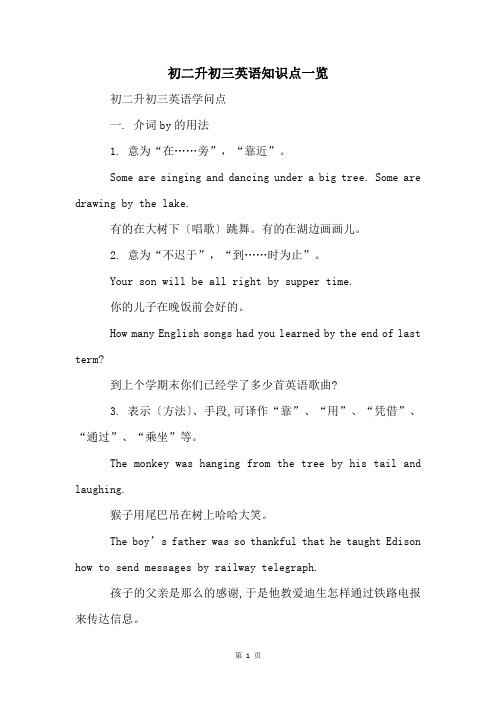
初二升初三英语知识点一览初二升初三英语学问点一. 介词by的用法1. 意为“在……旁”,“靠近”。
Some are singing and dancing under a big tree. Some are drawing by the lake.有的在大树下〔唱歌〕跳舞。
有的在湖边画画儿。
2. 意为“不迟于”,“到……时为止”。
Your son will be all right by supper time.你的儿子在晚饭前会好的。
How many English songs had you learned by the end of last term?到上个学期末你们已经学了多少首英语歌曲?3. 表示〔方法〕、手段,可译作“靠”、“用”、“凭借”、“通过”、“乘坐”等。
The monkey was hanging from the tree by his tail and laughing.猴子用尾巴吊在树上哈哈大笑。
The boy’s father was so thankful that he taught Edison how to send messages by railway telegraph.孩子的父亲是那么的感谢,于是他教爱迪生怎样通过铁路电报来传达信息。
4. 表示“逐个”,“逐批”的意思。
One by one they went past the table in the dark.他们一个一个得在黑暗中经过这张桌子。
5. 表示“依据”,“根据”的意思。
What time is it by your watch?你的表几点了?6. 和take , hold等动词连用,说明接触身体的某一部分。
I took him by the hand.我拉住了他的手。
7. 用于被动句中,表示行为主体,常译作“被”、“由”等。
English is spoken by many people.英语被很多人说。
八升九语法过关复习学案2-人教版英语(新九年级)暑假衔接

Unit 3 单元语法一、揭开could的“面纱”第一层:时态could为can的过去式,常用于一般过去时,表示能力、许可和可能性。
如:He could play the piano when he was four.他四岁时就会弹钢琴了。
第二层:语气could 为情态动词,用法与can相同,但could表示的语气更委婉。
could 常用来引导疑问句,表示比较委婉地提出请求或建议。
如:Could I take this seat,sir,if you don't mind?先生,如果你不介意,我可以坐这个位置吗?第三层:句式1.“Could you please…?”意为“请你做…好吗?”,常用来向对方提出请求;please 有时可以省略,后跟动词原形;其肯定回答可以是“Yes, sure/Yes, I can/Yes, of course.”否定回答常用“Sorry,I can’t. I...”如:-Could you please clean your room?你能打扫一下你的房间吗?Yes, sure. /Sorry, I can’t. I have to do my homework.当然可以/对不起,我不能,我必须做作业。
2.“Could I…?”意为“我能做…?”常用于向对方提出礼貌的请求.请求对方允许自己做某事。
其肯定回答可以用“Sure/Of course/No problem”;否定回答可以用“Sorry,...”如:-Could I use your computer?我能用你的电脑吗?-Of course. /Sorry,I’ll use it.当然。
/对不起,我要用它。
巩固练习1. -Could you help me with my English after school? --__________.A. It's a pleasureB.With pleasureC. You're welcomeD.OK.I could2.-Mom, it's too hot. __________I swim in the lake?-No, __________ you. That's too dangerous!A.Should;can'tB.Need;mustn'tC. Must: needn'tD.Could;mustn't3.-Could you go to the new movie with me now?-Sorry, I__________. Look, it's time for me to watc h “The Reader" on CCTV.A.can'tB.canC.needn'tD.must4.-Could you please __________ me before you go to the party?-No problem.A.callB.calledC.callingD.to call5.Lily__________ swim when she was four. And now she is a good swimmer.A.couldB.canC.shouldD.might二、按要求改写句子,每空一词。
人教版英语 初二升初三培优资料(4)
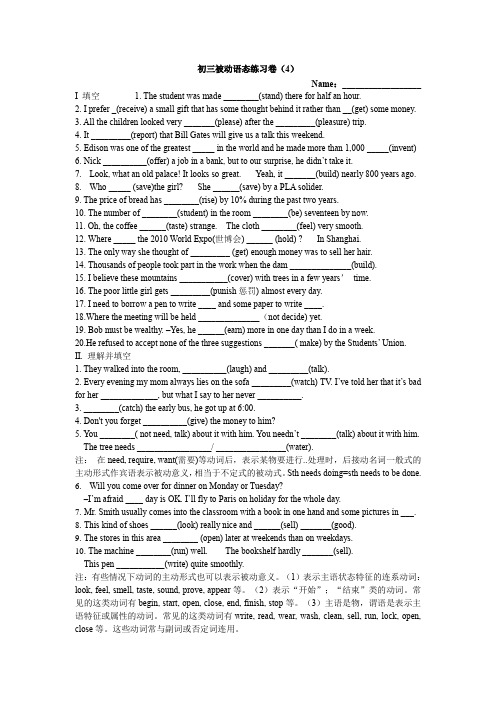
初三被动语态练习卷(4)Name:__________________I 填空 1. The student was made ________(stand) there for half an hour.2. I prefer _(receive) a small gift that has some thought behind it rather than __(get) some money.3. All the children looked very _______(please) after the _________(pleasure) trip.4. It _________(report) that Bill Gates will give us a talk this weekend.5. Edison was one of the greatest _____ in the world and he made more than 1,000 _____(invent)6. Nick __________(offer) a job in a bank, but to our surprise, he didn’t take it.7. --Look, what an old palace! It looks so great. --Yeah, it _______(build) nearly 800 years ago.8. --Who _____ (save)the girl? --She ______(save) by a PLA solider.9. The price of bread has ________(rise) by 10% during the past two years.10. The number of ________(student) in the room ________(be) seventeen by now.11. Oh, the coffee ______(taste) strange. The cloth ________(feel) very smooth.12. Where _____ the 2010 World Expo(世博会) ______ (hold) ? --In Shanghai.13. The only way she thought of _________ (get) enough money was to sell her hair.14. Thousands of people took part in the work when the dam ______________(build).15. I believe these mountains ___________(cover) with trees in a few years’time.16. The poor little girl gets _________(punish惩罚) almost every day.17. I need to borrow a pen to write ____ and some paper to write ____.18.Where the meeting will be held ______________(not decide) yet.19. Bob must be wealthy. –Yes, he ______(earn) more in one day than I do in a week.20.He refused to accept none of the three suggestions _______( make) by the Students’ Union.II. 理解并填空1. They walked into the room, __________(laugh) and _________(talk).2. Every evening my mom always lies on the sofa _________(watch) TV. I’ve told her that it’s bad for her _____________, but what I say to her never __________.3. ________(catch) the early bus, he got up at 6:00.4. Don't you forget __________(give) the money to him?5. You ________( not need, talk) about it with him. You needn’t ________(talk) about it with him. The tree needs _________________/ ________________(water).注:在need, require, want(需要)等动词后,表示某物要进行..处理时,后接动名词一般式的主动形式作宾语表示被动意义,相当于不定式的被动式。
人教版英语 初二升初三培优资料(10)
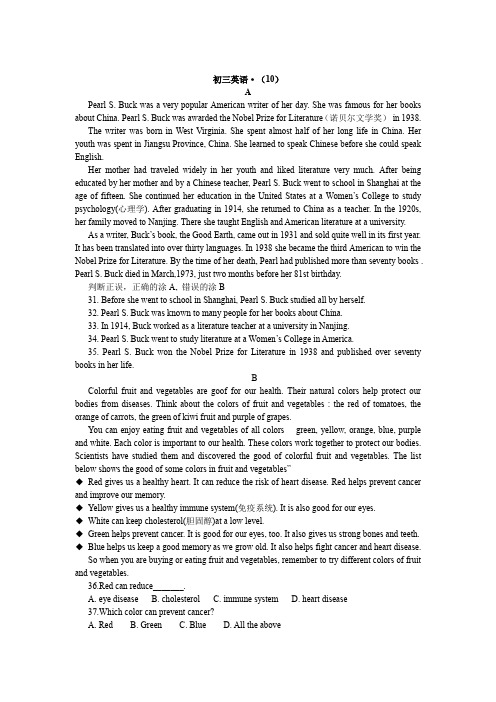
初三英语·(10)APearl S. Buck was a very popular American writer of her day. She was famous for her books about China. Pearl S. Buck was awarded the Nobel Prize for Literature(诺贝尔文学奖)in 1938.The writer was born in West Virginia. She spent almost half of her long life in China. Her youth was spent in Jiangsu Province, China. She learned to speak Chinese before she could speak English.Her mother had traveled widely in her youth and liked literature very much. After being educated by her mother and by a Chinese teacher, Pearl S. Buck went to school in Shanghai at the age of fifteen. She continued her education in the United States at a Women’s College to study psychology(心理学). After graduating in 1914, she returned to China as a teacher. In the 1920s, her family moved to Nanjing. There she taught English and American literature at a university.As a writer, Buck’s book, the Good Earth, came out in 1931 and sold quite well in its first year. It has been translated into over thirty languages. In 1938 she became the third American to win the Nobel Prize for Literature. By the time of her death, Pearl had published more than seventy books . Pearl S. Buck died in March,1973, just two months before her 81st birthday.判断正误,正确的涂A, 错误的涂B31. Before she went to school in Shanghai, Pearl S. Buck studied all by herself.32. Pearl S. Buck was known to many people for her books about China.33. In 1914, Buck worked as a literature teacher at a university in Nanjing.34. Pearl S. Buck went to study literature at a Women’s College in America.35. Pearl S. Buck won the Nobel Prize for Literature in 1938 and published over seventy books in her life.BColorful fruit and vegetables are goof for our health. Their natural colors help protect our bodies from diseases. Think about the colors of fruit and vegetables : the red of tomatoes, the orange of carrots, the green of kiwi fruit and purple of grapes.You can enjoy eating fruit and vegetables of all colors--- green, yellow, orange, blue, purple and white. Each color is important to our health. These colors work together to protect our bodies. Scientists have studied them and discovered the good of colorful fruit and vegetables. The list below shows the good of some colors in fruit and vegetables”◆Red gives us a healthy heart. It can reduce the risk of heart disease. Red helps prevent cancer and improve our memory.◆Yellow gives us a healthy immune system(免疫系统). It is also good for our eyes.◆White can keep cholesterol(胆固醇)at a low level.◆Green helps prevent cancer. It is good for our eyes, too. It also gives us strong bones and teeth.◆Blue helps us keep a good memory as we grow old. It also helps fight cancer and heart disease.So when you are buying or eating fruit and vegetables, remember to try different colors of fruit and vegetables.36.Red can reduce_______.A. eye diseaseB. cholesterolC. immune systemD. heart disease37.Which color can prevent cancer?A. RedB. GreenC. BlueD. All the above38. Which color can improve our memory?A. RedB. GreenC. BlueD.A and C39.If you want to keep your body strong, which colors are good for you?A. Red and GreenB. Blue and yellowC. White and orangeD. All of above40. The passage mainly tell us ______A. the importance of the colorful fruit and vegetables.B. white can keep cholesterol at a low levelC. yellow is also good for our eyes.D. green gives us strong bones and teethC Feeling felt out?A reader wrote in to say that she was feeling lonely at break(短暂休息) because her best friend wasn’t around. Here’s our advice to her—and to all kids who feel lonely sometimes.It’s hard when a best friend isn’t around—maybe because she moved to a different school or different class. You may feel lonely at break or lunchtime. You want to have new friends, but how do you make them? Maybe it seems like everybody else already has their friends. But remember, there’s always room for more friends.Start by looking around your classroom—think about which kids you’d like to play with at break. Look for chances to say hi to them, smile, and be friendly. Offer to share something or express your appreciations(欣赏) to them. Invite someone to play with you or say “Do you want to sit here?” in the lunchroom. When you’re at break, walk ov er to kids you want to play with, act friendly, and say “Hi, can I play, too?” or just join in.If you have trouble doing this or if you’re feeling shy, ask your teacher to help you make new friends. Teachers are usually pretty good at matching up friends. The best way to make friends is to be a friend. be kind, be friendly, share, say nice things, offer to help—and pretty soon, you’ll have one, or two, or even more new friends.You might still miss that special best friend. but when you see each other, you can share something you didn’t have before she left: you can introduce her to your new friends!( )41. This text is written for _____.A. teachers.B. parents.C. students.D. visitors.( )42. According to the writer, some kids feel lonely at break because they ____.A. have trouble with their studies.B. don’t have their best friends around.C. need their parents to be with them.D. are too young to look after themselves.( )43. The underlined word this in Paragraph 4 refers to (指的是)_____.A. sharing your ideas.B. talking before many people.C. studying better at schoolD. developing new friendship.( )44. Some kids need help from teachers to make friends because ____A. they miss their old friends a lotB. they have no time to stay with others.C. teachers know who wants a new friendD. they are shy or not good at making friends.( )45. The expression “feeling left out” means _____ in Chinese.A. 受冷落 B 被调侃 C 挨批评 D 遭攻击DLike many people, I have no clear idea about heroes. At some point, we all wonder if we need a hero and what a hero really is.Although there are a lot of differences in cultures, heroes around the world generally share anumber of characteristics (特点) which give us courage and make us want to learn from them.A hero does something worth talking about. A hero has a special story to tell and people think highly of it. But a hero is not just the person with great fame (声誉) .A hero has powers larger than himself. Some people want to live like a hero, and they have to experience life with new and further meaning. A sure test for would-be heroes is what or whom they serve. What do they want to live and die for? If the answer suggests they serve only their own fame, they may be famous persons but not heroes.A hero has a vision from the mountaintop. He has the power to move people. He creates new possibilities. Without Gandhi, India might still be part of Britain. Without Martin Luther King, Jr., Americans might take different buses, eat in different restaurants, go for walks in different parks, and shop in different stores because of the different colors of their skin.There might be changes in society without a hero, but the speed of change would be rather slow. Thanks to heroes in history, they make the society develop so rapidly.41. According to this passage, a hero is a person who always __________.A. gives us courageB. thinks highly of othersC. shares great fameD. stands on the mountaintop42. If you want to live like a hero, you should __________.A. experience a new and meaningful lifeB. listen to something worth talking aboutC. serve your own fame and try to be famousD. know where and how you want to live and die43. The underlined word “vision” in the passage means “__________”.A. 风景B. 想象C. 远见D. 形象44. Black people in America used to __________ before Martin Luther King, Jr..A. shop at the white’s storesB. drive buses with the whiteC. take wal ks in the white’s parksD. eat in restaurants without the white45. What can we learn from the passage?A. We don’t need heroes anymore at some point now.B. Heroes are all the same though different in cultures.C. People get power from heroes to move to a new place.D. Our society has developed faster because of heroes in history.从下列方框中选出选项,并用其合适的形式填入空白,使文章完整(20%)We should learn how (1)_______ our problems.Most of us have probably (2)______ our friends, parents or teachers. Sometimes people can (3)_______ angry for long about a small problem. I don’t think it’s necessary. Time (4)________, and good friendship may be lost. On the other hand, we can see that people sometimes have disagreements and decide (5)_______ to each other. However, this does not (6)______ for long. Maybe it tells us to solve a problem by (7)______ to forget.Don’t learn to complain. We must learn how to change these problems into challenges. As your adults, it’s our duty (8)___ to deal with each challenge in our education with the help of our teachers.We should learn from Steven Hawking. He is always (9)________ his many physical problems as unimportant. We are probably healthy and smart. Let’s not worry about our problems. Just face the challenges (10)_______.We sometimes say the lion is “the king of the forest”because it is stronger and more dangerous than other animals. It is at the top of the food chain on 1 . In the sea, the shark is at the top of the food chain. It can 2 faster than most other sea animals. It can also catch other sea animals and eat them.What is at the top of the 3 food chain? Human! We are not the biggest or fastest, but we are the 4 . We invented cars so that we can move the fastest. We invented guns to hunt the animals. We are very clever to invent things, 5 we can be dangerous, too. For example, many years ago in Inner Mongolia, people used guns to ___6____ a lot of wild wolves which usually eat wild rabbits. But in recent years, with the decreasing(减少) of the number of wild wolves, the number of wild rabbits is ___7____ bigger and bigger. And the wild rabbits begin to compete(竞争) for the grass 8 the sheep and cows. As a result, much of the grassland becomes desert because it is ___9____ destroyed by the rabbits.Remember that we are a part of the food chain, so we are in 10 , too! If we protect animals, we protect ourselves.简单介绍Jim学习英语的情况:1 学习英语有5年多了。
人教版英语 初二升初三培优资料(3)

被动语态(一) 语态分类1. 英语动词有两种语态.,主动语态和被动语态。
主动语态表示主语是动作的执行者,被动语态表示主语是动作的承受者。
如:They will build a new bridge over the river. (主动)A new bridge will be built over the river. (被动)2.汉语中常用“被”、“给”、“由”、“受”等词用来表示被动,而英语用:助动词be + 及物动词的过去分词构成。
3.被动语态的基本结构:be + p.p . by....4.当主语是动作的执行者时,动词用主动语态(Active Voice);如果主语是动作的承受者,动词便用被动语态(Passive V oice)。
We cleaned the classroom yesterday. 昨天我们打扫了教室。
The classroom was cleaned by us yesterday. 昨天教室被我们打扫了。
(二) 被动语态的时态、人称和数的变化1. 主要体现在be的变化上,其形式与系动词be的变化形式完全一样。
以give 为例,如下:一般现在时:am / is / are + given 一般过去时:was / were + given一般将来时:shall / will + be given 过去将来时:should / would + be given 现在进行时:am / is / are + being + given 过去进行时:was / were + being + given 现在完成时:have / has + been + given 过去完成时:had + been + given2.知识练习:以动词watch为例,写出其被动语态的各种时态形式:1.一般现在时_________________2. 现在进行时_________________3.一般过去式_________________4. 过去进行时_________________5.现在完成时_________________ 6 一般将来时_________________7.过去将来时_________________ 8. 过去完成时_________________(三)常见的八种时态中的被动语态1. 一般现在时:(1)People grow rice in the south of the country.Rice is grown in the south of the country.2. 一般过去时:They agreed on the building of a new car factory last month.The building of a new car factory was agreed on last month.3. 一般将来时:They will send cars abroad by sea.Cars will be sent abroad by sea.4. 过去将来时:The manager said they would complete the project by the end of the year.The manager said the project would be completed by the end of the year.5. 现在进行时:The radio is broadcasting English lessons.English lessons are being broadcasted on the radio.6. 过去进行时:The workers were mending the road.The road was being mended.7. 现在完成时:Someone has told me the sports meeting might be put off.I have been told the sports meeting might be put off.8. 过去完成时:When I got to the theatre, I found they had already sold out the tickets.When I got to the theatre, I found the tickets had already been sold out.(四)含有情态动词的被动语态:含有情态动词的被动语态是由“情态动词+ be+ 及物动词的过去分词”构成。
2021-2022学年八年级升九年级英语人教版暑假专题讲义:初中句型汇总(无答案)

八升九暑假综合复习Day12 初中句型汇总句型1:There+be +句型英语中的there be结构主要表示某处存在有某物,所以通常被称为存在句。
其中的there为引导词,无词义,be为谓语动词,there be后面的名词为句子主语。
There be结构的否定式和疑问式:1、否定式:there be结构的否定式通常应将否定词置于动词be之后:There ______________________ for you. 我帮不了你什么忙。
若谓语中包括有助动词或情态动词,通常将否定词置于助动词与情态动词之后:There _________________ so many mistakes. 不可能有那么多错误。
另外注意以下类型的否定式:There ____________________________ any difficulty over the money question. 在钱的问题上似乎没发生什么困难。
2、疑问式:there be结构的疑问式通常应将否定词置于动词be之后:Is there any good film______________? 映什么好电影吗?若谓语中包括有助动词或情态动词,通常将助动词或情态动词移至句首构成疑问式:_______________________ any new developments? 有什么新的发展吗?另外注意以下类型的疑问式:如:Uncle Jesse, why do there have to be poor people like those? 杰西叔,为什么一定要有他们那样的穷人?There be结构的谓语形式:1、主谓一致问题:若只有一个主语,谓语的数则取决于该主语的数;若有几个主语并列,则通常是与靠近的主语保持一致:There_________a pen and some books on the desk. 桌上有一支钢笔和一些书。
人教版英语 初二升初三培优资料(5)
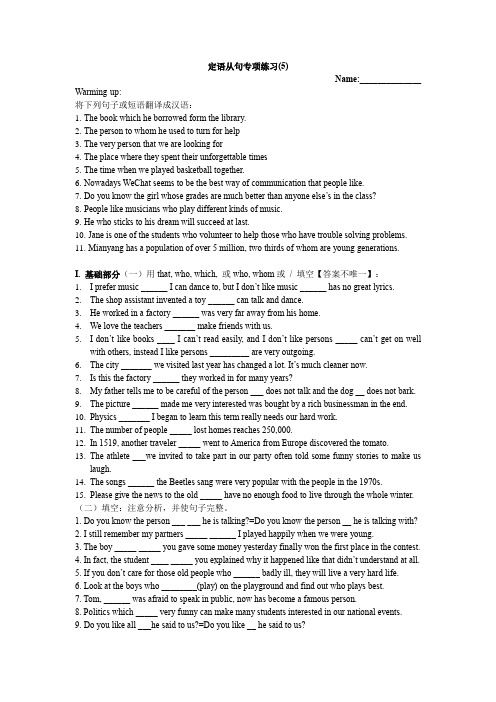
定语从句专项练习(5)Name:______________ Warming-up:将下列句子或短语翻译成汉语:1.The book which he borrowed form the library.2.The person to whom he used to turn for help3.The very person that we are looking for4.The place where they spent their unforgettable times5.The time when we played basketball together.6.Nowadays WeChat seems to be the best way of communication that people like.7.Do you know the girl whose grades are much better than anyone else’s in the class?8.People like musicians who play different kinds of music.9.He who sticks to his dream will succeed at last.10.Jane is one of the students who volunteer to help those who have trouble solving problems.11.Mianyang has a population of over 5 million, two thirds of whom are young generations.I. 基础部分(一)用that, who, which, 或who, whom或/ 填空【答案不唯一】:1.I prefer music ______ I can dance to, but I don’t like music ______ has no great lyrics.2.The shop assistant invented a toy ______ can talk and dance.3.He worked in a factory ______ was very far away from his home.4.We love the teachers _______ make friends with us.5.I don’t like books ____ I can’t read easily, and I don’t like persons _____ can’t get on wellwith others, instead I like persons _________ are very outgoing.6.The city _______ we visited last year has changed a lot. It’s much cleaner now.7.Is this the factory ______ they worked in for many years?8.My father tells me to be careful of the person ___ does not talk and the dog __ does not bark.9.The picture ______ made me very interested was bought by a rich businessman in the end.10.Physics _______ I began to learn this term really needs our hard work.11.The number of people _____ lost homes reaches 250,000.12.In 1519, another traveler _____ went to America from Europe discovered the tomato.13.The athlete ___we invited to take part in our party often told some funny stories to make uslaugh.14.The songs ______ the Beetles sang were very popular with the people in the 1970s.15.Please give the news to the old _____ have no enough food to live through the whole winter. (二)填空:注意分析,并使句子完整。
人教版英语 初二升初三培优资料(1)
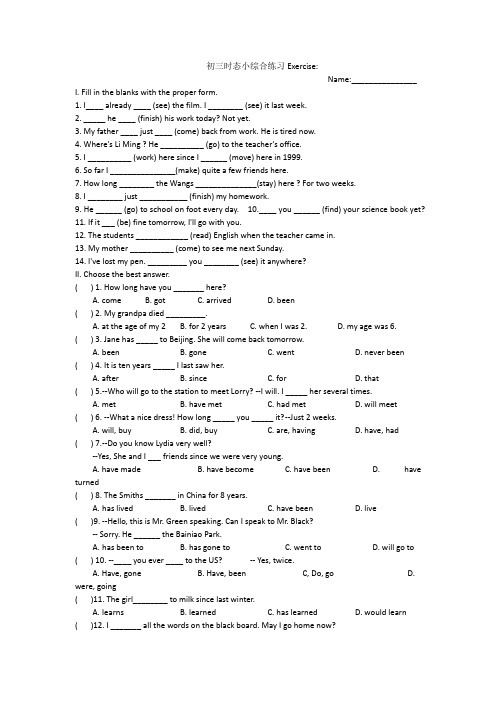
初三时态小综合练习Exercise:Name:_______________I. Fill in the blanks with the proper form.1. I____ already ____ (see) the film. I ________ (see) it last week.2. _____ he ____ (finish) his work today? Not yet.3. My father ____ just ____ (come) back from work. He is tired now.4. Where’s Li Ming ? He __________ (go) to the teacher’s office.5. I __________ (work) here since I ______ (move) here in 1999.6. So far I _______________(make) quite a few friends here.7. How long ________ the Wangs ______________(stay) here ? For two weeks.8. I ________ just ___________ (finish) my homework.9. He ______ (go) to school on foot every day. 10.____ you ______ (find) your science book yet?11. If it ___ (be) fine tomorrow, I'll go with you.12. The students ____________ (read) English when the teacher came in.13. My mother __________ (come) to see me next Sunday.14. I've lost my pen. _________ you ________ (see) it anywhere?II. Choose the best answer.( ) 1. How long have you _______ here?A. comeB. gotC. arrivedD. been( ) 2. My grandpa died _________.A. at the age of my 2B. for 2 yearsC. when I was 2.D. my age was 6. ( ) 3. Jane has _____ to Beijing. She will come back tomorrow.A. beenB. goneC. wentD. never been ( ) 4. It is ten years _____ I last saw her.A. afterB. sinceC. forD. that( ) 5.--Who will go to the station to meet Lorry? --I will. I _____ her several times.A. metB. have metC. had metD. will meet ( ) 6. --What a nice dress! How long _____ you _____ it? --Just 2 weeks.A. will, buyB. did, buyC. are, havingD. have, had ( ) 7.--Do you know Lydia very well?--Yes, She and I ___ friends since we were very young.A. have madeB. have becomeC. have beenD. have turned( ) 8. The Smiths _______ in China for 8 years.A.has livedB. livedC. have beenD. live( )9. --Hello, this is Mr. Green speaking. Can I speak to Mr. Black?-- Sorry. He ______ the Bainiao Park.A.has been toB. has gone toC. went toD. will go to ( ) 10. --____ you ever ____ to the US? -- Yes, twice.A. Have, goneB. Have, been C, Do, go D. were, going( )11. The girl________ to milk since last winter.A.learnsB. learnedC. has learnedD. would learn ( )12. I _______ all the words on the black board. May I go home now?A. copyB. will coupC. copiedD. have copiedIII. Rewrite the sentences.1. I have been to Macau before. (改为否定句) I _________ _________ been to Macau before.2. He hasn’t come to scho ol because he was ill. (就划线部分提问)______ _______ he come to school?3. I bough a new bike just now. (用just改写) I _____ just ____ a new bike.4. We began to learn English three years ago.(改为同义句)We ______ _________English ________three years ago5. He has never surfed, _______ _______? (改成反意疑问句)6. They have been here since 2000. (对划线提问) ____ ____have they been here?7. The old man _____ last year. He has _____ _______for a year. (die) (动词填空)8. Miss Gao left an hour ago. (同义句转换) Miss Gao has _____ _____ _____ an hour ago. Ⅳ. Use “never, ever, already, just, yet, for, since” to fill in the blanks.1. I have _______ seen him before, so I have no idea about him.2. Jack has _________ finished his homework.3. Mr. Wang has taught in this school ________ ten years.4. “Have you ________ seen the film?”“No, I have ________ seen it.”5. “Has the bus left _______?”“Yes, it has _________ left.”二、用since和for填空1.______two years2.____two years ago3.___last month4.______ 19995._______yesterday6._______ 4 o’clock 7 4 hours 8._____an hour ago 9. ___we were children 10._____ lunch time11.____ she left here 12. He has lived in Nanjing ___ the year before last.13. I’ve known him ______ we were children.14. Our teacher has studied Japanese ______ three years.15. She has been away from the city ______ about ten years.16. It’s about ten years __________ she left the city.三、非延续性动词转换为以下延续性动词或者表示可以延续的状态的短语。
人教版八升九英语Unit3暑假预习讲义
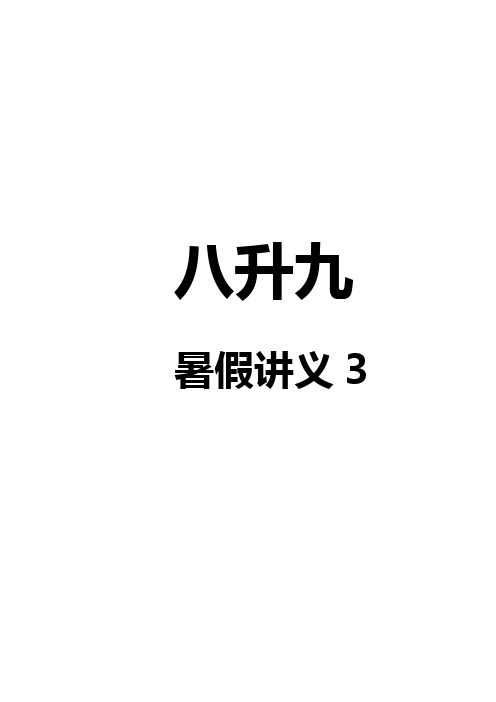
八升九暑假讲义3第三章基础点拨Unit 3 Could you tell me where the restrooms are ?【短语归纳】1. be allowed to do sth 被允许干… allow sb to do sth 允许某人干… allow doing sth 允许干…2. sixteen-year-olds = sixteen-year-old boys and girls 16岁的孩子3. part-time jobs 兼职工作4. a driver’s license 驾照5. on weekends 在周末6. at that age 在那个年龄段7. on school nights 在上学期间的每个晚上8. stay up 熬夜9. clean up (相当与及物动词) 清扫10. fail (in) a test 考试不及格11. take the test 参加考试12. the other day 前几天13. all my classmates 我所有的同学14. concentrate on 全神贯注于15. be good for 对…有益16. in groups 成群的,按组的17. get noisy 吵闹(系表结构)18. learn from 向某人学习19. at present 目前,现在20. have an opportunity to do sth 有做…的机会【重点句型】1. I don’t think twelve-year-olds should be allowed to get their ears pierced.我认为不应该允许12岁的孩子穿耳孔.2.They talk instead of doing homework. 他们聊天而不是做作业.3.He is allowed to stay up until 11:00 pm. 允许他们熬到晚上11点.4.We should be allowed to take time to do things like that more often.我们应该被允许更加经常的花些时间多做这类事情.5.What school rules do you think should be changed?你认为学校的哪些制度应该改一改了?6.The two pairs of jeans both look good on me. 这两条牛仔裤穿在我身上都适合.7.The classroom is a real mess. 教室太脏了.8.Should I be allowed to make my own decisions?9.Only then will I have a chance of achieving my dream.只有这样我才能实现我的梦想.10.They should be allowed to practice their hobbies as much as they want.应该允许他们对业余爱好想练多长时间就练多长时间.11.We have nothing against running. 我们没有理由反对他跑步.考点讲解词法1.【allow】allow sb. to do sth. 允许某人做某事(主动语态)如:Mother allows me to watch TV every night. 妈妈允许我每晚看电视。
- 1、下载文档前请自行甄别文档内容的完整性,平台不提供额外的编辑、内容补充、找答案等附加服务。
- 2、"仅部分预览"的文档,不可在线预览部分如存在完整性等问题,可反馈申请退款(可完整预览的文档不适用该条件!)。
- 3、如文档侵犯您的权益,请联系客服反馈,我们会尽快为您处理(人工客服工作时间:9:00-18:30)。
8上重要考点Unit 11.He helped the poor _____(he).2.Help yourself ____ some fish/water.3.“I must give up smoking”, Tom said/thought to _____(he).4.They seem _____(be) bored.5.It seems _____ a good idea.6.It seems _____(good) to arrive on time.7.It seems _____ he knows the girl.8._____ a diary.(写日记)9.Feel like _____(swim).10.Feel _____(bore).Feel _____(tire).11.I feel like _____ I was a bird.12.If you feel terrible, you can try _____(open) the window.13.I will try _____(help) the poor.14.You can try _____ the blue one.15.No _____ you look happy.16.I _____ what you do that for?17.Live _____ somewhere quiet.18.Go _____ somewhere warm19._____ a few / _____ a little _____ a few / _____ a little_____few / little20.He is excellent _____ selling books.21.I have enough money _____(buy) the food.22.She is so clever _____ she can solve the food.23.She is too old _____(look) after themselves.24.I like sports, such as _____(run) and _____(swim).25.As for _____(play) sock.26.Do ______ I told you.27.She is _____ old as me = She is same age _____ me.28.She is not _____ old as me.29.Leave the paper _____ it is.30._____(当) I was watching TV, she came in.31._____(因为) it rained, we had to stay at home.32.Decide not _____(talk) with such a man.33.Don’t decide _____ such thing so quickly.34.In the end, I decided _____ Mianyang.35.At last, we make a _____(decide).36.Wait _____ the bus stop.37.Wait _____(go) home.38.A _____ student(优生) shouted _____ the top of his voice.39.Give me _____ hand.40.It’s made _____ hand.41.They walked in the street hand _____ hand.42._____ three days(每三天一次).43.Go on _____ our class.44.I dislike _____(go) fishing.45.Like46.The following story=_____ the clouds. _____ zero.(零下)_____ the sea level.(海平面以下)47.Find _____ the truth.48.I find _____ useful to read aboard.49.I have nothing _____ money.50.I did nothing but _____(leave).51.I have no choice but _____(leave).52.She _____(出发) for Beijing yesterday.53.The sun came _____.54.Please let me know if anything come _____(发生).55.Jump up and down _____ excitement.56.She got up early so _____ she could catch the bus. Unit 21.The light is still _____.2.I often sleep with the light _____.3.I often sleep with the door _____.4.The movies has _____ for a long time.5.Because of her son’s _____(die).6.Burn the man to _____(die).7.The man was _____(die).8.The man _____(die) two years ago.9.The man ______(die) for two years.10.Die of _____(hungry).11._____ most(最多) _____ least(至少)12._____(超过) 20 people.13._____(不到) 20 people.14.She is more _____ a teacher.15.How _____ Tom didn’t go to the dentist. =16.How _____ you come so early? =17.Mary hardly ever _____(exercise), _____(反义疑问)?18.I can hardly swim _____ dance.19.She could hardly see _____(something).20.I surf the internet _____(one) a month.21._____(一旦) you get there, you won’t miss it.22.Once upon _____ time.23.Be _____(fill) of. = be _____(fill) with.24._____ (沏)coffee.25.Eat _____(health).26.Sports can keep us _____(health).27.How _____ percent?(百分之多少)28.60 percent of them _____ good.29._____60 percent of it _____ good.30.Although she is only 9, _____ she can look after herself.31.Although she was tired, she ______ kept working.32.She work out the problem, ______(然而).33._____, (然而)she likes math.34.Keep the words in _____.35._____ the dog.36._____ up one’s mind to do something.37.She has a quick _____.38.Change one’s _____.39.I’m sorry!_____Never _____ !40.I don’s mind _____(open) the door.41.Would you mind _____ opening the door.42.At the _____(dentist).43.4.3_____44.It’s rude to point _____ others.45.He pointed _____ the mountain and stared shouting.46.Ask for a _____.47.Take/have 3 days _____.48.the _____(最新) news/match.49.Look _____ the test paper.50.How many …? (然而)51.Who …?_____52.What …? (然而)53.All of them aren’t teachers.(翻译)54._____ of the twins like it.55._____ of the students like it.56.Lucy together with us often _____(go) there.57.It rained heavily, _____(因此), we couldn’t go there.58._____(因为) the heavy rain, we couldn’t go out.59.We can relax by_____(use) the Internet.60.We can relax _____(介词) sports.61._____ is my vacation.62.这么好的女孩。
63._____ good friends.64._____good weather.65.They are _____(friendly) that we all like them.66.They are _____ good friends that we all like them.67._____ many friends. _____ people like it._____ little money! _____ much money.68.There is _____ little money that we can’t offord it.69.There are _____ little kids that they get lost.Unit 31._____ the price. _____ you hand. =2._____ your eyes.3._____ a family.4._____ a dog. = _____ a dog.5._____ one’s voice.6._____ rice. = _____ rice.7._____ midnight.8.Fix _____ the bike. =9.Have my bike _____(repair).10.Have my hair _____(cut).11.He _____(fix) up the bike just now.12.Take _____ his father. = _____. =13.A _____(broke) pen.14.The _____(disable). =15.Make a difference _____ my life.16._____ blind/deaf.17._____ blind.(失明)18.Be blind _____ educating children.19.He is blind _____ his mistake.20.Meet with _____(difficult).21.People in _____(difficult).22.Have difficult _____ something.__=___Have difficult _____ doing something.23.The store is _____(open) from 8:00 to10:00.24.The store _____(open) at 8:00 a.m.25.Leave/keep the door _____.26.Open _____ our eyes to the world.27._____ the open air.28.You should say “sorry” _____ open.29.The museum will be open _____ us.30.Knock _____ the door.31._____(看) the door.32.Carry _____ the plan.33.Train him _____ a spy.34.At a _____(train) center.35.Train him _____(watch) the patients.36.Keep something _____ mind. = learn something _____ heart.37.Than______ Than______ Than______38.As_______ As_______ As_______39._____ one’s mind.(启迪)40.Run _____ somebody.e _____ somebody.____42._Jump _____ somebody.___43.__Turn _____ some body.___44.Leave one’s _______(辞职)45.__________of work.46.I’d like some tea _____ nothing in it.e _____ to somebody.48.At _____ time.49.Have a rest. = take a _____ from doing. Unit 41._____ a seat.2.He went in and _____(seat) himself.3.A _____ friend.4.Live close _____ my house.5.Keep/have the door _____(close).6.I laughed _____(happy).7.A ticket _____ Beijing.8.A ticket _____ the movie.9.In the end, I chose not _____(go) there.10.She is _____(pretty) than me.11._____ do you like the book?12.Three meals _____ day.(一日三餐)13._____(做) meals.14._____ some music. _____ a movie.15.10 minutes’ ride. =16._____(fashion) show.17.Have a talent _____ singing. =18.She is _____(serious) ill.19._____(wait) time. _____(sleep) bag.20._____ the people.为人民服务21.Take _____ active part in.22.One of the _____(creative) _____(perform) _____(want) to go there.23.It’s up _____ you when to leave for Beijing.e _____. = run _____ of.25.Play the _____ of a doctor.26.She is our _____ role.(楷模)27.We have nothing _____ common.28.Make _____ a play.29.Make _____ a team.30.The poor.(翻译)31.The theater is crowded _____ people.32._____(挤进) into the room.33.Who _____ got talent.34.I’ve _____ a pet.Unit 51.An accident happened _____ him.2.She _____ to meet her former teacher.3.The sports meeting _____ every four years.4._____ this situation.5._____(看) the new.6.Would you mind _____(我) opening the door._____, you’d better not.7.I don’t mind _____ young people think of me.8.I can’t stand _____(wait) for him.9.She _____(plan) to go abroad 2 days ago.10.Please _____ a plan _____ the meeting.11.Have a _____(discuss) about something.12.We expect _____(get together).13.She expects to come back tomorrow.(翻译)14.Play a joke _____ somebody.15.It’s a _____(mean) day, do you know _____the _____(mean) of doingthat.16.It _____(mean) a lot to us.17._____ Chinese culture.18.Lu Xun is famous _____ his works. _____ a writer _____ the peoplearound the world.19.The girl _____(appear)(消失) in the end.20.The man appears quite happy.=21.The rich _____ rich.22.Shanxi is _____ in apple.23.a _____ student who know failure is the mother of the success24.You will be successful _____(get) on well with others.25.I don’t know the reason _____ the accident.26._____(因为) this reason.27.I don’t know the reason _____ she told me.28.I don’t know the reason _____ she come late.29. _____(luck), she lost her way.30.He is _____ in games all day.31.She is always _____(乐意) to help others.32.Please got ready _____ the sports meeting.33._____ knowledge.(常识)34.We have _____(多) in common.35.Have a strong _____(性格).36.Simple-----____(副)-----_____(比较级)37.I’ll take the _____(girl) place to help the poor. =38._____ the army.(参军)39. _____(介) the army.40.I want to find out what is going _____ around the world.41._____ day, she came up with a good idea.42._____ day, you will achieve your dream.43.Can you think _____ some useful methods?44.The book came _____(出版) last year.45.在20世纪30年代。
